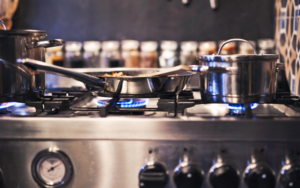
With the cost of living crisis affecting households across the UK, consumers are looking for more ways to save cash. In this article, we share how much it costs to use your kitchen appliances to cook a meal and how you can save money around the home. To find out more about your energy usage, read our article 'How much electricity am I using?'
What is the cheapest way to cook?
How much it costs to cook a meal varies depending on the appliance you are using. In the following table, we break down the average cost for each appliance for the time it is used. The cost per unit is based on the Ofgem energy price cap rates of 6.34p/kWh of gas and 24.86/kWh of electricity. The appliance usage is based on the average energy usage for each appliance and the time used is based on how long you may use the appliance for in a day. For example, an oven may be on for a total of an hour a day over the course of a few meal times, toast for a family of 4 at a few minutes each will equate to roughly 10 minutes and a slow cooker meal is often cooked over a longer period of time e.g. 6 hours. How much it actually costs to cook per household can vary, depending on the energy efficiency of your appliances and how long it is used.
The cheapest way to cook food - a comparison
| Daily usage | Daily cost | Monthly cost | Annual cost | |
| Oven (fan oven - preheated) | 1 hour | £0.34 | £10.18 | £123.87 |
| Gas oven | 1 hour | £0.09 | £2.84 | £34.16 |
| Electric hob | 30 mins | £0.18 | £5.40 | £65.70 |
| Gas hob | 30 mins | £0.06 | £1.85 | £22.20 |
| Electric grill | 20 mins | £0.12 | £3.60 | £43.80 |
| Microwave | 10 mins | £0.04 | £1.20 | £14.60 |
| Air Fryer | 30 mins | £0.11 | £3.16 | £38.46 |
| Slow cooker | 6 hours | £0.29 | £8.64 | £105.12 |
| Toaster | 10 mins | £0.04 | £1.20 | £14.60 |
As the table demonstrates, some kitchen appliances - such as the slow cooker - are more energy efficient when compared to an oven, therefore you could make simple changes in the kitchen to save money.
Compare energy deals
Protect yourself against high energy rates by comparing energy deals with Uswitch
- Enter your postcode
- Compare energy deals
- Switch energy in minutes
How to save money in the kitchen
Below we share some money-saving tips for when cooking and preparing food in the kitchen:
- Use multiple appliances to cook your meal, for example, par-cook your jacket potato in the microwave and finish it off in the oven, this reduces the time the oven is on and therefore reduces energy usage.
- Use a slow cooker for some meals instead of the oven as slow cookers are more energy efficient despite being used for longer periods of time.
- Batch cook meals and freeze or chill the leftovers so that they can later be reheated in the microwave.
- Let food cool down before placing it in the fridge/freezer as the appliance has to work harder to keep the area cool (and there is also a risk of bacteria multiplying if the food is not cooled correctly).
- Boil water in a kettle and then transfer it to the hob as this will save energy compared to boiling the water in a pan.
- Only use and boil as much water as you need or if you boil a full kettle for your tea you can transfer the remaining hot water to an insulated flask which you can then use when you make another hot drink.
- Cover pots and pans to speed up the process of heating food and boiling water.
- Turn off the oven or electric hob a few minutes before the food is fully cooked as the residual heat will help to finish off the cooking.
- Try to avoid opening the oven door when checking on your food as this releases hot air and therefore wastes energy as the oven tries to reach temperature again.
How to save money around the home
There are numerous ways you can also save money around your home and we share some of these tips below:
- Use energy-saving light bulbs
- Turn the tap off when brushing your teeth
- Shower instead of having a bath
- Collect a bucket of water when showering and use this to water your plants
- Choose more energy-efficient appliances when buying/replacing items around the home
- Don't leave appliances on standby
- Ensure your dishwasher and washing machine are full before turning on
- Use eco settings on appliances where possible
- Get a smart meter to understand how much energy you are using
Additional money-saving tips
For more money-saving tips you may find the following articles useful:






